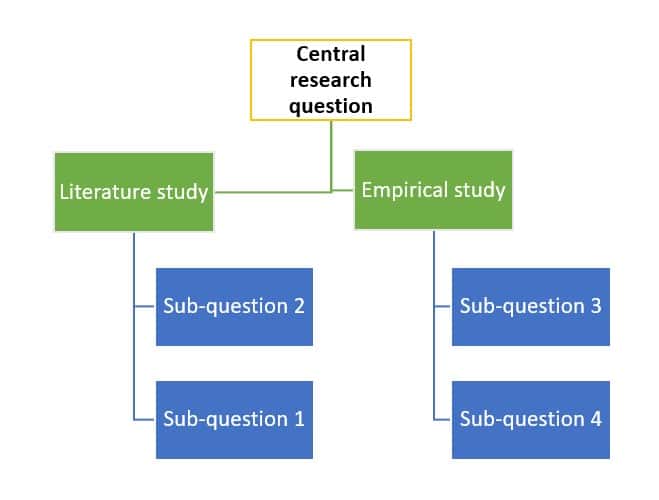Phase 1: Starting your thesis project
Before thinking about a topic for your thesis, it is important for you to first develop a solid understanding of what a thesis actually is. Next, you should find a suitable topic to investigate and write about. After finding a suitable topic, you should start looking for relevant literature. At the end of this first phase, you should create a problem statement, central research question and related sub-questions. The phase is usually finished by writing a research proposal.
Thesis tips: first phase
Are you looking for solid tips to help you through the first phase of your thesis project? Read all the relevant tips below.
What is a thesis?
Everyone is familiar with writing an essay, but it is important to understand what writing a thesis actually upholds and how this resembles, but is also different from writing an essay. An essay is a form of writing that has a clear structure with obvious paragraphs that each argue a certain claim. The whole essay is designed around answering a central question. The arguments that are put forward are backed up by research, and these arguments can either support or reject different perspectives of the topic of your essay. The essay ends with a conclusion that combines all presented information. The conclusion can either support or reject your view(s) on the research question. So, it is essential that you are able to critically examine information and provide a unique interpretation thereof.
Writing a thesis is, in some way, similar to writing an essay, as different viewpoints and arguments have to be presented, which have to be backed up by literature. However, the thesis is also built around research conducted by you. Be mindful of the fact that you cannot base your thesis solely on existing theories and information – you will have to add your own novel fragment of knowledge and interpretation thereof through the study that you conduct on your own. In fact, this is also the main difference between an essay and a thesis: independently picking and justifying your research methods, and then conducting, analyzing and reporting the study. Aside of this, many students also need to write a final portfolio or advisory report.
Manage your thesis advisor
As writing a thesis is an independent and individual task, a thesis advisor will be appointed to you by your institution. He or she will guide you throughout the entire thesis project process. Therefore, it is important to develop and keep a good relationship with your thesis advisor. You should plan an initial appointment with your thesis advisor, as it is important to discuss not only the topic of your thesis, but also the way you can work on your thesis most effectively. Everyone’s different, so it is a good idea to already think about possible problems you may encounter along the way. Also, everyone has their own preferred style of working, and there are large individual differences when it comes to motivation and what motivates you. It may help to set up fixed appointment dates with your thesis advisor. Before meeting for the first time, ensure you are aware of all your institution’s demands and criteria for a thesis (you may wish to consult a study guide to do so). Such demands often also include the maximum amount of guidance you may receive from your thesis advisor.
It is recommended to reach an agreement with your thesis advisor concerning when and how contact will take place (in person, via telephone, or via e-mail). If you prefer working with deadlines, you can also plan a number of intermediate deadlines. Ensure any contact with your thesis advisor will remain amiable and prepare all appointments adequately. As there are limits to the amount of guidance you will receive, you should make sure to use such guidance most effectively!
Motivation and maintaining the bigger picture
In the present article, we mostly provide content-related tips, but we’ve noticed many students start their thesis full of enthusiasm, but ultimately do not finish their thesis. Often, this has to do with a decrease in motivation, discipline and focus, and not having enough overview and a lack of proper planning (read our tips on this here). Occasionally, this is caused by procrastination and/or study evasiveness.
The topic of your thesis
Exploring relevant information and literature forms the start of your thesis project. However, you can only start doing that once you’ve picked a topic. Pick a topic that has your interest. After all, you’ll spend the next couple of months working on it! Many students also include their thesis topic in their resume. So, it is a good idea to pick a topic which does not only have your interest, but which also fits with what you’d like to do during the rest of your professional career. To find a suitable topic, you could:
- Check whether you’ve come across an interesting topic during your education, such as a topic that was part of a course that was taught;
- Reading the discussion sections of (scientific) papers, which often include suggestions for future research;
- Being inspired by your teachers, internship mentor or an external company;
- Being inspired by recent events;
- Do you want to write a thesis that relates to your future profession? Would you like your thesis topic or the specific methodological skills you acquire while writing a thesis to be a part of your job market portfolio? Do you see any on-the-job research opportunities?;
- Finding suitable topics in literature sources that interest you.

Picking a fun and suitable topic is comparable to hunting for treasures. You usually start with an interesting idea or something you’ve read or heard somewhere. Next, you start reading up on this idea until you’ve found a suitable topic. In case you’re writing your thesis for a company, your topic will often also be based on a problem that exists within the company. So, when picking a company to focus on and do an internship with, do not only rely on the reputation of said company, but also make sure they can offer you a suitable topic to write your thesis about. Are the topics they have to offer really what interest you? Always ask yourself a question during this first phase: is it realistic to conduct a study on this topic within the time I have been given?
A common pitfall is to want to investigate too much within too short a time span. It is important to pick a concrete topic and to adjust your topic when it becomes too comprehensive. Limit yourself to one aspect of the topic you’re interested in. A handy tool for starting your thesis is a mindmap. After formulating a topic, it is advisable to first construct a table of contents for your thesis. It’ll be helpful to develop a solid framework, structure, and guideline for yourself. Of course, these can be adjusted at a later stage if necessary. Your thesis is mainly a ‘work in progress’ and demands a flexible work attitude.
Thesis proposal
Once a topic for your thesis is selected, the next step of the process is to write a research proposal. Writing a proposal involves a substantial amount of serious work such as finding and reviewing relevant literature, identifying a specific gap in this literature, and formulating a research question that is both managerially as well as academically relevant. The key aim of a thesis proposal is to convince your thesis supervisor that the thesis you propose will meet the criteria for a master thesis, and that you will be able to deliver an interesting and relevant study within the available time.
Writing a thesis proposal, ie finding a research gap ánd a relevant research question in time, is one of the most difficult parts of the thesis.
Central research question and sub-questions
Developing a central research question is difficult, but important. Your research questions will be important and handy guiding themes when writing your thesis. The central research question is aligned with your research goals. The purpose of such a question is to provide insight into what you would like to investigate. Formulating a suitable central research question can take a lot of time, especially at the start of your project.
Once your central research question and goals are clear, however, you’ll have a strong hold to guide your literature searches and for conducting the empirical (research) part of your project. As a result, your study will run a lot more smoothly! So, your thesis simply cannot exist without a solid central research question. The central question concerns what you’d like to study exactly, and why. But how can you formulate a solid central research question? It is a good idea to first immerse yourself into the topic for a few days, and then set everything aside and ask yourself: what would I really like to find out about this topic? What would I like to investigate?
A pitfall of many students is to develop a central research question that is too broad. One tip would be to formulate a specific central research question, by including specific terms that are related to your topic of interest. For example, if you’d like to investigate ‘trauma’, as a topic, this is too broad. However, if you’re set on investigating traumatic memory episodes in children with ADHD, this is more concrete and therefore more suitable for formulating a central research question.
When formulating a suitable central research question, three factors play a key role:
- Focus;
- Specificity of the question;
- Use of ‘question-words’, such as: How …? In what way …? Which …? To what extent …?
As soon as you’ve found a suitable topic, make sure you increase your focus by picking one sub-topic (to make sure your topic really adds something to the existing body of literature and is not too vague/broad, or in other words, to make sure your topic is important enough). Next, be sure to make this sub-topic really specific. This means you should be able to fit the sub-topic into your thesis and falsify it (as it should not be too broad!). A solid central research question should be an open-ended question with a clear and unambiguous formulation, and should be based on facts and not on opinions. The question should not have an answer yet! Your research questions will make or break your study, so be sure to think carefully about what to pick and how to formulate your questions, and talk about your ideas with fellow students.

As you can see in the above example, a central research question consists of a number of sub-questions. Your central research question is subdivided into such sub-questions. Be sure the sub-questions accurately reflect all relevant aspects of your central research question! Every sub-question should allow a concrete investigation. Together, they shape the answer of the central research question. Limit the number of sub-questions. Ten sub-questions is usually too much. Around six or seven sub-questions (with a focus on existing literature and empirical investigation) should suffice. You can choose to subdivide your sub-questions into primary (empirical) and secondary (literature research-based) questions. Of course, it is also possible to have a sub-question that can be answered with both primary and secondary forms of investigation.
Introduction
As part of your proposal¸ which is the starting document that guides your thesis, you’ll often already write an introduction or a first draft based on the literature you want to focus on. Having a solid introduction is crucial.
Writing an introduction forces you to think about what you’ll actually be investigating. Your introduction will at least contain:
- Your motive for writing: your motive can be a social trend, a government decision, a problem that you observed within your own organization, a quote by someone who is authoritative on a topic, and so forth. In short, it should be an observation that draws a reader’s attention. Try to develop both an internal and an external motive for writing.
- The problem statement and purpose for conducting the study: it is important to make sure these flow logically from your motive for writing.
- Relevance: indicate why your problem statement is important to address with regards to theory and practice.
When writing, always keep your reader (your grader!) in the back of your mind. Often, introductions written by students are unnecessarily dull and short, and many students assume a reader is already familiar with the key aspects of a topic. In short: such an introduction barely motivates a reader to continue reading. Think about how movie producers create trailers for a new movie: all the highlights of the movie are included and presented in quick succession. Such a trailer spikes curiosity and makes you feel the movie is probably great. This is also your goal when writing an introduction: sell your thesis as an interesting story that is a must-read!
Please see our web page Academic Writing for more information and tips about academic writing.
Phase 2: the literature study
The literature studies you conduct as part of writing your thesis are intended to provide an overview of the current state of the field surrounding your topic. Designing a solid literature study has different steps, ranging from searching for and collecting literature to selecting and processing literature.
Literature study for your thesis
As stated, a literature study is an overview of the current state of the field surrounding your topic. Use this to your advantage! For your thesis, you are supposed to write a coherent and critical overview. Do not just make notes of what you read, but try to connect different articles and find underlying themes using argumentation and evidence.
It is a daunting task to find books, articles, websites and other publications that are relevant for your thesis. Using the reference lists of articles, it is possible to find new relevant literature sources, for example by relying on your institution’s academic search engine. In case you need practical information concerning companies, it’s recommended to look for branch organizations or delve into publications of the Central Agency for Statistics (CBS). In addition, your thesis advisor may have handy tips for you. Relying on a textbook is also a good starting point.
If you investigate the reference list of such a textbook, you’ll most definitely come across potentially interesting publications. You could then use the reference lists of such publications to find even more relevant literature (the so-called snowball method). One disadvantage of this method, is that you’ll find increasingly older literature. It is also recommended to keep your own consistent literature list right from the get go. Should you find interesting publications, be sure to add them to your own literature list. This ensures you don’t have to search for where you read what bit of information later on, and you avoid not being able to trace back information. Be sure to stick to the following guidelines when you’re conducting your literature search:
- Write down the key terms and parts of your central research question and use these as search terms;
- Use multiple search terms, synonyms, and combine search terms;
- Use both English and Dutch search terms, if applicable;
- Move from broader to increasingly more narrow search terms, such as healthy living -> nutrition -> food groups
- Organize all information prior to using it for your thesis;
- Be sure to have a clear and logical flow and structure of your writing output beforehand (click here for an outline/ structure of a quantitative thesis).
A common pitfall during a literature study is to want to tackle too many topics at once. A literature study is not as easy as it may seem. Keep your patience and work in small incremental steps. Start a new paragraph. Then, write an entire section, and then an entire chapter. By starting small and ending big, you maintain your focus and motivation while writing your thesis. Of course, it is also important to integrate the literature you found into your thesis. As you’ll most likely be spending a lot of time with your thesis and finding and selecting relevant literature, it is a good idea to use an aid when doing so. It could be handy to make use of the software package Mendeley, which helps you to organize your literature and maintain a reference list, also by allowing you to store and select articles at all times.
These days, a conceptual model is often also expected to be included in your thesis, which is presented at the end of your literature study. In it, you are supposed to provide a model of what you’ve investigated and list what hypotheses you developed, if any.

Phase 3: The empirical study
This phase forms the core of the thesis project. It is important to think beforehand about the research methods you’d like to employ (you can find tips about how to write a method section here). After conducting your empirical study independently, you’ll set out to analyze the data you obtained through it.
Tips for your empirical study
In this section, general tips will be provided firstly, followed by a discussion of quantitative and qualitative research.
General tips for your empirical study
It is only after finishing your theoretical framework that you’ll start your empirical study. Designing a solid empirical study is not an easy task, so make sure your topic is set in stone before starting with your empirical study. In this third phase, you’ll set up your own study independently, and you’ll then collect participants and run it. It is important to keep thinking about all the choices you make, such as your choice of study design. Make sure you are knowledgeable of all potentially suitable designs and consider all advantages and disadvantages before making a choice that fits your empirical study most optimally.
Make sure to mention your considerations in the method section of your thesis. In addition, it is important to consider the reliability and validity of your study: how have you ensured these are as high as possible? Many textbooks will give you an explanation of these considerations, but if you continue to find it difficult to make informed decisions, you may wish to consult one of our thesis coaches.
Remind yourself of the fact that you should be able to clarify all choices you’ve made during this phase of your thesis project and that you should be able to convince a reader of your professionalism. Also beware not to turn cocky: try and construct a realistic design of your study and heed your planning. Sometimes, it can be interesting to conduct both qualitative and quantitative research. Relying on both of these methods of research will ensure you’ll have more content and will, in most cases, increase the reliability of your study (for more information on this, look up the term ‘triangulation’).
Qualitative research
Check our separate page here, which was written for students who are required to run a qualitative study as part of their master’s thesis project.
Are you looking to attain more in-depth information, and do you really want to reach the essence of what your topic is about? Would you like to find out what convictions and motivations have caused certain opinions, choices or actions? Is there only limited knowledge available on your topic? In these cases, it may be a good idea to consider qualitative research as your study design of choice. Relying on qualitative research, you’ll reach fewer people, but you’ll gain a richer understanding of a topic. You can reach people face-to-face, online (through Skype), by telephone or via a group discussion or brainstorm session.
Do not forget to bring an audio recorder to record everything. You’ll be able to take your time to elaborate and not miss any important information. Often, interviews are transcribed in full and added in the appendix of your thesis. Such an interview could be an in-depth interview, a semi-structured interview or a fully structured interview. It is important to think beforehand about who you’d like to interview and with what purpose. For example, you could interview a number of people belonging to your target group, but make sure these people are representative of the group. In addition, it could be interesting to conduct a number of interviews with experts. By doing so, you’ll be interviewing someone who is highly knowledgeable about your topic and the market, which could yield valuable information for your thesis.
Qualitative research – analysis
For your thesis, it is important to show how you’ve analyzed your qualitative data and which methods you relied on to do so. You could opt to first organize the transcriptions of your interviews into different sub-topics. You could do so through copying and pasting bits of text, with the purpose of organizing all statements into different themes. So, the intent is to employ a top-down view and to attempt to list common themes. Then, for each of these themes, you paste the relevant bits of information from your transcripts. Each sub-topic then gets its own label. Lastly, you’ll then note your most important findings in your thesis, usually in the results section. Try and make your results section interesting and easy to read, by citing your participants’ statements as examples and as support for your arguments and conclusions.

Quantitative research
Does your institution require you to provide insights about your topic that concern statistics? Would you like to know more about a larger group of people? In such cases, a quantitative design may be your most optimal research design choice. As part of a quantitative study, you’ll include a relatively large number of participants. Participation could occur via telephone or the internet, but face-to-face participation is also an option. Collecting quantitative data commonly occurs via questionnaires, in the shape of a survey (you can read all about designing great survey questions here). However, there are also other options. Think carefully about how you could reach your target group.
Some questions you could ask yourself when designing a quantitative study, are: how could I reach my desired participants? What possibilities are there for me to do so, and what response rate can I expect? If you, for example, would like to set up a quantitative study for a relatively small start-up company investigating a new product from China, it might be difficult to employ surveys as a means of reaching existing customers in China. You could opt to go for a qualitative study design. When designing a survey, it is important to have a clear goal in mind. As soon as you’ve listed what information you need to obtain, you can use such an overview to create your survey. One tool which might come in handy, is the so-called operationalization model.
After collecting your data, you are expected to analyze these. Such analyses are often conducted using software packages, such as Excel, Stata, Matlab, ArcGis or SPSS. Should you require help or support with your analyses, you can employ a Topscriptie data analyst.
4
Phase 4: Writing and rewriting
Writing is mainly a process of thinking and a result of hard work, which is why it is often regarded as difficult by students. Of course, you may have interesting ideas and thoughts about how you’d like to present information in your thesis, but thinking up the most suitable formulations can often be tricky.
Writing and rewriting your thesis
It is entirely possible to keep procrastinating: one more night of TV! However, ultimately, you’ll have to get behind your computer and start writing! The writing process is generally regarded as difficult by many students. Below, we’ll give you some tips to smooth-en the process for you. Keep in mind that writing a thesis is a lengthy process: stay patient and write a few hours on a daily basis. Make sure you can work uninterrupted, as academic writing relies on your thinking process! Start a paragraph, write a section, and end with a chapter. Providing interim summaries is also a good habit to have. Allow your readers some breathing space by providing summaries and announcing what a reader can expect from upcoming sections. If you usually run into trouble when writing a solid and constructive piece, try to subdivide your theme of writing into several sub-themes that are important to discuss. Then, also subdivide those sub-themes further. Before starting to write, make sure you devise a plan to guide your writing. Such a plan consists of a detailed overview of what you want to write in which paragraph, for each paragraph you’d like to include. Think critically about a solid structure for your writing. Additionally, it is advised to write in past tense, seeing as your research will have been completed by the time you’re writing your thesis. Your target audience should be non-specialized colleagues, so when you’re, for example, a communications students, do not explain that communication consists of a transmitter and a receiver, as this is something even first year students will know!
Thesis golden rule: for every sentence, paragraph, section and chapter, you should wonder if what you are writing is relevant for your thesis. Does this sentence add to what I want a reader to know? Contrary to what many thesis writers think, writing more words does not necessarily improve the quality of your output. Often, writing too much results in vague and barely readable sections. Make sure to write objectively, precisely, logically and carefully! At the end of the writing process, it is advised you read through your own work critically, as though it was written by someone else. When doing so, pay attention to grammar and sentence structure. Realize that the Word spelling check tool is not omniscient, especially when it comes to grammatical errors. It could be useful to have a fellow student read your thesis critically. You could also let your thesis be checked by our language experts. And, in spite of working hard, it is essential to remain critical about your own output: dare to scrap words and improve your writing! Linguistics is becoming an increasingly important aspect of grading a thesis. Of course, between the lines, it is even more important, as nobody will be taking you seriously if your sentences do not flow as they should and are with grammatical errors, in spite of your content being accurate.

Phase 5: Wrapping up your thesis
You’ve almost wrapped up your thesis, and you’re now starting to write your general summary, introduction and conclusion.
Tips: wrapping up your thesis
When wrapping up your thesis, your main concern will be the overall layout of your thesis. In this phase, you’ll write a clear summary (you can find our tips for writing a summary here) and a preface. In addition, you’ll create a neat index for your thesis, double check if all references are listed correctly, and you’ll make sure everything is presented in a uniform layout. All this is done to increase the readability of your thesis.
General tips for wrapping up your Topthesis:
- Re-read your thesis to correct any lingering grammatical errors;
- Pay heed to your writing style: make sure to let others read your thesis, or have a professional correct your writing, as you may be inclined to read over a lot of your own grammatical errors;
- Appendices serve the purpose of providing extra background information on certain topics that are important for your thesis. For example, lengthy tables, figures, surveys, and SPSS output are all added in the appendix. Every addition to the appendix will need to get its own numbering. For the appendix, the page numbering of your thesis should be continued. The main text of your thesis should always reference al your appendices;
- Write your summary only when your thesis is largely finalized;
- Add a reading guide to your thesis, which is intended to indicate what a reader can expect to find, and to provide a brief overview of the different chapters of your thesis;
- The conclusion section is written lastly. Make sure you write down all ideas for your conclusion section when you’re writing your thesis. It is also a good idea to start each chapter with a brief introduction, and end with a conclusion. Many institutions also expect you to include a discussion section in your thesis;
- For your reference list, list all author names alphabetically. Consult a study guide to make sure you understand what directions you should stick to for your reference style. This is usually the APA style of referencing;
- Check again if all the information you provide serves to answer your central research question and sub-questions. In the midst of writing (especially when your deadline looms), you may lose track of the thread that runs through your thesis;
- Read your thesis again when you are about to defend, and practice by making use of example questions you can expect during your defense.
Do you require tips for your thesis defense? Or would you like to have your thesis checked for content, language or structure by a professional? Would you like to receive help with a specific part of your thesis project?
Topscriptie has provided well over 3680 students with a top thesis!
Can we help you get your top thesis as well?
